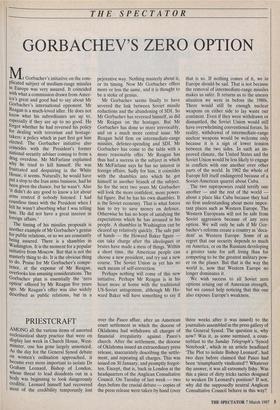THE SPECTATOR
GORBACHEV'S ZERO OPTION
Mr Gorbachev's initiative on the com- Plicated subject of medium-range missiles in Europe was very assured. It coincided with what a commission drawn from Amer- ica's great and good had to say about Mr Gorbachev's international opponent. Mr Reagan is a much-loved idler. He does not know what his subordinates are up to, especially if they are up to no good. He forgot whether he had reversed his policy for dealing with terrorism and hostage- takers: a policy which in part first got him elected. The Gorbachev initiative also coincides with the President's former national security adviser coming to from a drug overdose. Mr. McFarlane explained why he tried to kill himself. He was frustrated and despairing in the White House, it seems. Naturally, he would have Put a stop to the Iran arms business, had he been given the chance, but he wasn't. Also it didn't do any good to know a lot about arms control if nobody listened. I had countless times with the President when I felt he wasn't absorbing what I was telling him. He did not have a great interest in foreign affairs.'
The timing of his missiles proposals is another example of Mr Gorbachev's genius for public relations, or so we are constantly being assured. There is a shambles in Washington. It is the moment for a popular initiative from Moscow. But that is not the masterly thing to do. It is the obvious thing to do. Praise for Mr Gorbachev's compe- tence, at the expense of Mr Reagan, overlooks less amusing considerations. The Gorbachev plan is essentially the 'zero option' offered by Mr Reagan five years ago. Mr Reagan's offer was also widely described as public relations, but in a pejorative way. Nothing masterly about it, or its timing. Now Mr Gorbachev offers more or less the same, and it is thought to be a stoke of genius. Mr Gorbachev seems finally to have severed the link between Soviet missile reductions and the abandoning of SDI. So Mr Gorbachev has reversed himself, as did Mr Reagan on the hostages. But Mr Gorbachev has done so more irrevocably, and on a much more central issue. Mr Reagan held firm on intermediate-range missiles, defence-spending and SDI. Mr Gorbachev has come to the table with a more reasonable offer. Mr Reagan has thus had a success in the subject in which Mr McFarlane says he has no interest in foreign affairs. Sadly for him, it coincides with the shambles into which he got himself in another branch of the subject. So for the next two years Mr Gorbachev will look the more confident, more power- ful figure. But he has his own shambles. It is the Soviet economy. That is what forces him to try to save money on defence. Otherwise he has no hope of satisfying the expectations which he has aroused in his people. A shambles in Washington can be cleared up relatively quickly. The safe pair of hands — the Howard Baker figure can take charge after the ideologues or brutes have made a mess of things. Within a short time, the American people can choose a new president, and try out a new course. The Soviet Union as yet has no such means of self-correction.
Perhaps nothing will come of this new initiative. Perhaps Mr Reagan is in his heart more at home with the traditional US-Soviet antagonism, although Mr Ho- ward Baker will have something to say if that is so. If nothing comes of it, we in Europe should be sad. That is not because the removal of intermediate-range missiles makes us safer. It returns us to the uneasy situation we were in before the 1980s. There would still be enough nuclear weapons on either side to lay waste our continent. Even if they were withdrawn or dismantled, the Soviet Union would still have overwhelming conventional forces. In reality, withdrawal of intermediate-range nuclear weapons would be welcome only because it is a sign of lower tension between the two sides. In such an im- proved climate, the United States and the Soviet Union would be less likely to engage in conflicts with one another over other parts of the world. In 1962 the whole of Europe felt itself endangered because of a Soviet-American quarrel about Cuba. The two superpowers could terrify one another — and the rest of the world about a place like Cuba because they had no firm understanding about more impor- tant places such as Western Europe. The Western Europeans will not be safe from Soviet aggression because of any zero option. We will only be safe if Mr Gor- bachev's reforms create a country as 'deca- dent' as Western Europe. Some of us regret that our security depends so much on America, or on the Russians developing a greater taste for soft living than for competing to be the greatest military pow- er on the planet. But that is the way the world is, now that Western Europe no longer dominates it.
We wish success to all Soviet zero options arising out of American strength, but we cannot help noticing that this one also exposes Europe's weakness.


























































 Previous page
Previous page